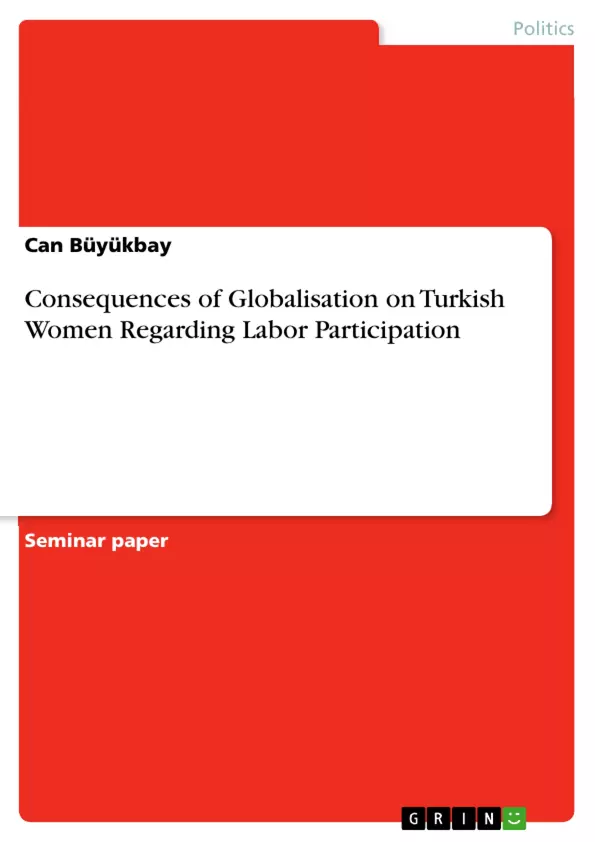Globalisation is marked by growing economic interdependence and internationalisation of capital. Some of the important characteristics of this phenomenon are the increasing interconnectedness between societies as a result of the rapid development of communications and growing trade, the invention of new technologies, increased capital mobility and the growing importance of transnational corporations (McGrew 2005: 22). It became increasingly clear that globalization was, from the beginning, a process based on gender discrimination, which meant it affected men and women differently in an economic, social and cultural sense. Global markets, free production zones, and new growth strategies make women the victims of development programmes. In Thailand, Bangladesh, Mexico, China and in many areas of the so-called “Third World”, western capital exploits the cheapest workforce. The governments there have offered their young women to the international capital and were willing to create so-called “free production zones” in which the capital has great freedom. Free production zones are being strongly criticised, because foreign companies do not need to respect any labour protection laws in these areas, and have plenty of room to manoeuvre and to pursue their interests. Critics come too, because the companies don’t need to consider the damage to the environment (Kümbetoglu/Caga 2001: 58).
Inhaltsverzeichnis (Table of Contents)
- 1. Introduction
- 2. Theoretical Framework
- 2.1 Globalization and its Impact on Women
- 2.2 Neo-liberalism and Turkish Economy
- 3. A Cultural Analysis of Turkish Society
- 3.1 Historical Background: Islam and Reforms
- 3.2 Work in Turkish Culture
- 4. Women Labor in Turkey
- 4.1 Migration and Weakening Social Networks
- 4.2 Informal Sector
- 4.3 Free Production Zones
- 4.4 Women Poverty in Turkey
- 4.5 Participation of Turkish Women in the Labor Force
- 4.5.1 Profile of the Women Employment
- 4.5.2 Reasons for the Low Participation of Women in the Labour Market
- 5. Conclusion
- 6. Further Reflection
Zielsetzung und Themenschwerpunkte (Objectives and Key Themes)
This paper aims to analyze the impacts of globalization on female employment in Turkey, to give a profile of the female labor force, and to discuss the reasons why the number of women does not increase in the area of employment in Turkey. Furthermore, how global actors exploit women's potential, and the way women are integrated to the global structure in Turkey will be analyzed.
- The impact of globalization on women's labor participation in Turkey.
- The characteristics and profile of the Turkish female workforce.
- The reasons behind the limited participation of Turkish women in the labor market.
- The role of global actors in exploiting female potential in Turkey.
- The integration of Turkish women into the global economic structure.
Zusammenfassung der Kapitel (Chapter Summaries)
The first chapter provides an introduction to the topic and sets the stage for the analysis by discussing the impact of globalization on women's labor participation, particularly in the context of developing countries. The second chapter establishes the theoretical framework, exploring different perspectives on globalization and its impact on women, including the Marxist perspective which views women as a source of cheap labor. Chapter three delves into the cultural context of Turkish society, examining the historical influences of Islam and reforms on work and women's roles. Chapter four focuses on the specific situation of women's labor in Turkey, analyzing factors such as migration, the informal sector, free production zones, and the challenges of women's poverty. The fifth chapter examines the participation of Turkish women in the labor force, including a profile of their employment and the reasons for their low participation rates.
Schlüsselwörter (Keywords)
This work focuses on the impact of globalization on women's labor participation in Turkey. Key terms and concepts explored include globalization, neo-liberalism, women's labor, cultural analysis, Turkish society, free production zones, informal sector, female employment, and gender discrimination.
Frequently Asked Questions
How does globalization affect women in Turkey?
Globalization creates economic interdependence but often leads to gender discrimination, where women are used as a source of cheap labor in global markets.
What are "free production zones"?
These are areas where foreign companies often bypass labor protection and environmental laws to exploit cheap workforces, frequently employing young women.
Why is female labor participation low in Turkey?
Reasons include cultural factors influenced by historical reforms and Islam, migration patterns, and the prevalence of the informal sector.
What role does neo-liberalism play in the Turkish economy?
Neo-liberal strategies have integrated Turkey into global structures, impacting how female labor is utilized and sometimes marginalizing women into poverty.
How does migration impact social networks for women?
Migration to urban areas can weaken traditional social support systems, making women more vulnerable in the labor market and the informal sector.
- Citation du texte
- Can Büyükbay (Auteur), 2009, Consequences of Globalisation on Turkish Women Regarding Labor Participation, Munich, GRIN Verlag, https://www.grin.com/document/143509



